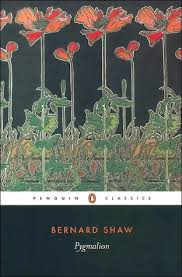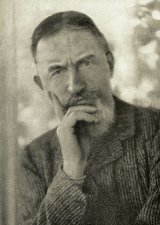Pygmalion Page #6
Pygmalion is a play by George Bernard Shaw, named after a Greek mythological figure. It was first presented on stage to the public in 1913. In ancient Greek mythology, Pygmalion fell in love with one of his sculptures, which then came to life.
HIGGINS. Good enough for what? THE FLOWER GIRL. Good enough for ye--oo. Now you know, don't you? I'm come to have lessons, I am. And to pay for em too: make no mistake. HIGGINS [stupent] WELL!!! [Recovering his breath with a gasp] What do you expect me to say to you? THE FLOWER GIRL. Well, if you was a gentleman, you might ask me to sit down, I think. Don't I tell you I'm bringing you business? HIGGINS. Pickering: shall we ask this baggage to sit down or shall we throw her out of the window? THE FLOWER GIRL [running away in terror to the piano, where she turns at bay] Ah--ah--ah--ow--ow--ow--oo! [Wounded and whimpering] I won't be called a baggage when I've offered to pay like any lady. Motionless, the two men stare at her from the other side of the room, amazed. PICKERING [gently] What is it you want, my girl? THE FLOWER GIRL. I want to be a lady in a flower shop stead of selling at the corner of Tottenham Court Road. But they won't take me unless I can talk more genteel. He said he could teach me. Well, here I am ready to pay him--not asking any favor--and he treats me as if I was dirt. MRS. PEARCE. How can you be such a foolish ignorant girl as to think you could afford to pay Mr. Higgins? THE FLOWER GIRL. Why shouldn't I? I know what lessons cost as well as you do; and I'm ready to pay. HIGGINS. How much? THE FLOWER GIRL [coming back to him, triumphant] Now you're talking! I thought you'd come off it when you saw a chance of getting back a bit of what you chucked at me last night. [Confidentially] You'd had a drop in, hadn't you? HIGGINS [peremptorily] Sit down. THE FLOWER GIRL. Oh, if you're going to make a compliment of it-- HIGGINS [thundering at her] Sit down. MRS. PEARCE [severely] Sit down, girl. Do as you're told. [She places the stray chair near the hearthrug between Higgins and Pickering, and stands behind it waiting for the girl to sit down]. THE FLOWER GIRL. Ah--ah--ah--ow--ow--oo! [She stands, half rebellious, half bewildered]. PICKERING [very courteous] Won't you sit down? LIZA [coyly] Don't mind if I do. [She sits down. Pickering returns to the hearthrug]. HIGGINS. What's your name? THE FLOWER GIRL. Liza Doolittle. HIGGINS [declaiming gravely] Eliza, Elizabeth, Betsy and Bess, They went to the woods to get a bird's nes': PICKERING. They found a nest with four eggs in it: HIGGINS. They took one apiece, and left three in it. They laugh heartily at their own wit. LIZA. Oh, don't be silly. MRS. PEARCE. You mustn't speak to the gentleman like that. LIZA. Well, why won't he speak sensible to me? HIGGINS. Come back to business. How much do you propose to pay me for the lessons? LIZA. Oh, I know what's right. A lady friend of mine gets French lessons for eighteenpence an hour from a real French gentleman. Well, you wouldn't have the face to ask me the same for teaching me my own language as you would for French; so I won't give more than a shilling. Take it or leave it. HIGGINS [walking up and down the room, rattling his keys and his cash in his pockets] You know, Pickering, if you consider a shilling, not as a simple shilling, but as a percentage of this girl's income, it works out as fully equivalent to sixty or seventy guineas from a millionaire. PICKERING. How so? HIGGINS. Figure it out. A millionaire has about 150 pounds a day. She earns about half-a-crown. LIZA [haughtily] Who told you I only-- HIGGINS [continuing] She offers me two-fifths of her day's income for a lesson. Two-fifths of a millionaire's income for a day would be somewhere about 60 pounds. It's handsome. By George, it's enormous! it's the biggest offer I ever had. LIZA [rising, terrified] Sixty pounds! What are you talking about? I never offered you sixty pounds. Where would I get-- HIGGINS. Hold your tongue. LIZA [weeping] But I ain't got sixty pounds. Oh-- MRS. PEARCE. Don't cry, you silly girl. Sit down. Nobody is going to touch your money. HIGGINS. Somebody is going to touch you, with a broomstick, if you don't stop snivelling. Sit down. LIZA [obeying slowly] Ah--ah--ah--ow--oo--o! One would think you was my father. HIGGINS. If I decide to teach you, I'll be worse than two fathers to you. Here [he offers her his silk handkerchief]! LIZA. What's this for? HIGGINS. To wipe your eyes. To wipe any part of your face that feels moist. Remember: that's your handkerchief; and that's your sleeve. Don't mistake the one for the other if you wish to become a lady in a shop. Liza, utterly bewildered, stares helplessly at him. MRS. PEARCE. It's no use talking to her like that, Mr. Higgins: she doesn't understand you. Besides, you're quite wrong: she doesn't do it that way at all [she takes the handkerchief]. LIZA [snatching it] Here! You give me that handkerchief. He give it to me, not to you. PICKERING [laughing] He did. I think it must be regarded as her property, Mrs. Pearce. MRS. PEARCE [resigning herself] Serve you right, Mr. Higgins. PICKERING. Higgins: I'm interested. What about the ambassador's garden party? I'll say you're the greatest teacher alive if you make that good. I'll bet you all the expenses of the experiment you can't do it. And I'll pay for the lessons. LIZA. Oh, you are real good. Thank you, Captain. HIGGINS [tempted, looking at her] It's almost irresistible. She's so deliciously low--so horribly dirty-- LIZA [protesting extremely] Ah--ah--ah--ah--ow--ow--oooo!!! I ain't dirty: I washed my face and hands afore I come, I did. PICKERING. You're certainly not going to turn her head with flattery, Higgins. MRS. PEARCE [uneasy] Oh, don't say that, sir: there's more ways than one of turning a girl's head; and nobody can do it better than Mr. Higgins, though he may not always mean it. I do hope, sir, you won't encourage him to do anything foolish. HIGGINS [becoming excited as the idea grows on him] What is life but a series of inspired follies? The difficulty is to find them to do. Never lose a chance: it doesn't come every day. I shall make a duchess of this draggletailed guttersnipe. LIZA [strongly deprecating this view of her] Ah--ah--ah--ow--ow--oo! HIGGINS [carried away] Yes: in six months--in three if she has a good ear and a quick tongue--I'll take her anywhere and pass her off as anything. We'll start today: now! this moment! Take her away and clean her, Mrs. Pearce. Monkey Brand, if it won't come off any other way. Is there a good fire in the kitchen? MRS. PEARCE [protesting]. Yes; but-- HIGGINS [storming on] Take all her clothes off and burn them. Ring up Whiteley or somebody for new ones. Wrap her up in brown paper till they come. LIZA. You're no gentleman, you're not, to talk of such things. I'm a good girl, I am; and I know what the like of you are, I do. HIGGINS. We want none of your Lisson Grove prudery here, young woman. You've got to learn to behave like a duchess. Take her away, Mrs. Pearce. If she gives you any trouble wallop her. LIZA [springing up and running between Pickering and Mrs. Pearce for protection] No! I'll call the police, I will.
Translation
Translate and read this book in other languages:
Select another language:
- - Select -
- 简体中文 (Chinese - Simplified)
- 繁體中文 (Chinese - Traditional)
- Español (Spanish)
- Esperanto (Esperanto)
- 日本語 (Japanese)
- Português (Portuguese)
- Deutsch (German)
- العربية (Arabic)
- Français (French)
- Русский (Russian)
- ಕನ್ನಡ (Kannada)
- 한국어 (Korean)
- עברית (Hebrew)
- Gaeilge (Irish)
- Українська (Ukrainian)
- اردو (Urdu)
- Magyar (Hungarian)
- मानक हिन्दी (Hindi)
- Indonesia (Indonesian)
- Italiano (Italian)
- தமிழ் (Tamil)
- Türkçe (Turkish)
- తెలుగు (Telugu)
- ภาษาไทย (Thai)
- Tiếng Việt (Vietnamese)
- Čeština (Czech)
- Polski (Polish)
- Bahasa Indonesia (Indonesian)
- Românește (Romanian)
- Nederlands (Dutch)
- Ελληνικά (Greek)
- Latinum (Latin)
- Svenska (Swedish)
- Dansk (Danish)
- Suomi (Finnish)
- فارسی (Persian)
- ייִדיש (Yiddish)
- հայերեն (Armenian)
- Norsk (Norwegian)
- English (English)
Citation
Use the citation below to add this book to your bibliography:
Style:MLAChicagoAPA
"Pygmalion Books." Literature.com. STANDS4 LLC, 2025. Web. 8 Jan. 2025. <https://www.literature.com/book/pygmalion_78>.




Discuss this Pygmalion book with the community:
Report Comment
We're doing our best to make sure our content is useful, accurate and safe.
If by any chance you spot an inappropriate comment while navigating through our website please use this form to let us know, and we'll take care of it shortly.
Attachment
You need to be logged in to favorite.
Log In